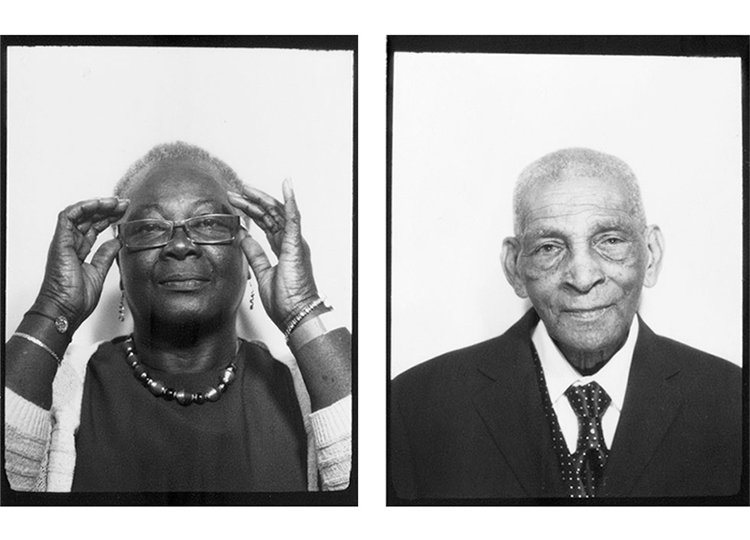To commemorate Windrush Day in 2021, we shared selfies and stories from Hackney’s Windrush generation as an outdoor display on the front of our building. Using a 1970s analogue photobooth to capture these portraits, Autograph partnered with Hackney Council and The Real Selfie Project who, like us, are based in Hackney and feel passionately about contributing to the visual and archival story of our borough.
To accompany the display, we commissioned Zita Holbourne to add her story. As a human rights activist and co-founder of Black Activists Rising Against Cuts (BARAC), Zita has spent many years campaigning for justice for members of the Windrush generation affected by a scandal first exposed in 2017. Below, Zita reflects on some of the key moments in this struggle, the impact it’s had – and continues to have – on people’s lives.
As a daughter of the Windrush generation, I grew up with my mother’s tales of sub-standard housing and racist abuse, but I also experienced it myself – it did not pass with one generation, and what is commonly known as ‘the Windrush scandal’ is still impacting on the Windrush generation and their descendants today.
The individual accounts featured in Autograph’s display Selfies and Stories from Hackney’s Windrush Generation are a common collective experience. Following World War II, the government invited people from the Caribbean and other commonwealth countries to Britain to help rebuild the economy. They arrived mainly by ship with an open mind, a positive attitude, and a desire to make something of themselves in the UK. Many sought to earn money to support the families they’d left back at home, and hoped to return after a few years.
I sometimes wonder: if they could have seen their own futures in the UK and the pain, hardship and racism to come decades later, would they have thought twice about making the long and difficult journey here? Would they still have separated from loved ones if they knew that they were moving to a place where they would encounter colour bars, overcrowded housing, low pay and discrimination in the labour market, education and service provision?
Of course, if they had not, I wouldn’t exist and so my story and my journey is intertwined with theirs – I stand on their shoulders. My strength and resilience through the hardest times in my life were borne out of their struggle to pave the way and create a place where they hoped we, the second and the third generations, would have a better future in the UK.
The scandal wasn’t unpredictable. As a trade union and community activist I had been campaigning against deportations for many years prior to 2017, when the Windrush scandal first started to surface. In 2012, BARAC UK, the organisation I co-founded, helped establish the Movement Against Xenophobia, to campaign against the then Immigration Act 2014. Even then, we warned of the fact that some of those who could be targeted under this legislation included members of the Windrush generation and others from across the African and Asian diasporas who migrated to the UK from commonwealth countries.
In 2016, I became aware of a mass deportation charter flight to Jamaica (I wrote about it for The Guardian) and campaigned alongside others to try and get it stopped using the hashtag #Jamaica50. Amongst those targeted for deportation were members of the Windrush generation, but it was not until March 2017 that the full scandal was exposed. During the years leading up to this, many of the people impacted were wary and cautious about coming forward and speaking out about what had happened to them and their families, and they were still trying to process the trauma and devastation of families torn apart and exiled for years or even decades.
Eventually, their stories began to come out and be heard. Stories of people who returned to their countries of birth in order to attend the funeral of a loved one, and who were then barred from returning. Stories of people who’d spent decades living and working in the UK being placed into detention centres, losing their homes and jobs in the process. These were people who had been invited to live and work in the UK as members of the British Empire, people who understood themselves to be British citizens, who had worked hard for decades, paying taxes, contributing to the economy and society, raising children and grandchildren, bringing with them a rich culture which is now embedded in British culture, contributing to sports, politics, music, public service, education and much more.
I, like others, had supported the campaign for a National Windrush Day. I signed the petition, proposed motions to trade union conferences in support, and even dedicated a poem to the campaign. When the campaign succeeded, it was at the height of the Windrush scandal and it felt like a slap in the face for the British government to talk of celebrating the contribution of our mothers and fathers, grandparents and aunts and uncles whilst still inflicting pain, injustice and trauma on them and their families.
Five years on, the scandal is far from over and the majority of those impacted have not received compensation. Even in the middle of the pandemic, the government sought to deport another plane full of people from the UK to Jamaica in December 2020. Meanwhile, the pandemic further exposed the race discrimination faced by that generation and subsequent ones in the UK. Discrimination in every aspect of life faced by the Windrush generation has led to poorer housing, low pay, and more likelihood of us working in precarious jobs and on the frontline. In turn, this has led to Black and Brown people contracting and dying of Covid-19 disproportionately.
In 2020, the long awaited Windrush Lessons Learned report was published. It found the Home Office to be guilty of institutional ignorance of racism and made 32 recommendations which are yet to be implemented. If lessons are truly to be learned, the government need to right the wrongs imposed on the Windrush generation and their families.
Acknowledging the stories, the lives, the struggles and the achievements of the Windrush generation is crucial going forward. Too many have already died without this acknowledgement. Displays such as this one play an important role in shining a light on the ordinary - but at the same time extraordinary - lives of those who made Britain their home. They survived racism, fascism and the Windrush scandal and what they’ve achieved has changed the face of Britain forever, contributing to our multi-cultural society and bringing with them strength, determination and resilience.
I have fond memories of photobooths: from official documents such as passports and identity cards, to capturing precious moments such as nights out with friends and cuddles with loved ones, I still have a few of those photos in my collection. The beautiful people of Hackney featured in this display are a reminder of what we went through, what we achieved and that despite the so-called hostile environment we have all endured, we have staying power.

is a human rights campaigner, community and trade union activist, Windrush Justice campaigner, artist and curator. She campaigns for equality, freedom and justice through arts and activism. She is the co-founder and National Chair of Black Activists Rising Against Cuts (BARAC) UK, the National Vice President of the PCS Union and Joint National Chair of Artists’ Union England. She is also a founding member of BME Lawyers for Grenfell and BAME Lawyers for Justice, and was joint National Co-ordinator of the Windrush Day of Action.
Zita exhibits art, performs poetry and speaks internationally. She is part of the UNESCO Coalition of Artists for the General History of Africa and the curator of the Roots Culture Identity art exhibition, established in 2013 in memory of Stephen Lawrence. She is the author of the book Striving for Equality Freedom and Justice, fusing the poetical with the political and has contributed to numerous books including New Daughters of Africa and the award-winning Here We Stand, Women Changing the World. You can follow Zita on Instagram and see more of her work on her website.

To commemorate National Windrush Day 2021, we shared remarkable self-portraits and stories from Hackney’s Windrush generation in a new display on our building.
Find out more
.png)

Autograph is a place to see things differently. Since 1988, we have championed photography that explores issues of race, identity, representation, human rights and social justice, sharing how photographs reflect lived experiences and shape our understanding of ourselves and others.